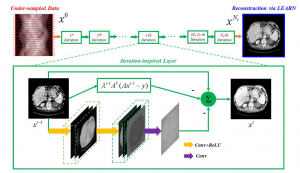Applying the Variational Neural Network to Diffuse Optical Tomography
Part of the field of computer vision is image restoration, which involves the removal of artifacts and noise from an image. This is especially applicable in medical imaging, where images are highly structured and image acquisition is difficult and expensive. The cost and size of a medical imaging system is frequently proportional to the amount of measurement data gathered. Thus, there is a high demand in the field of medical imaging for the development of reconstruction methods that can perform well in the absence of fully sampled data. Variational neural networks (VNNs) have recently seen success when applied to 2D magnetic resonance imaging (MRI) data. The considered project will be extending a variational neural network to 3D and applying it to an imaging system with a highly ill-posed system matrix. The contributions of this project are as follows:
- Extension of the VNN to the 3D DOT problem to improve the resolution of the reconstructed image.
- Several modifications to the VNN to stabilize the training method.
Methodology
The LEARN architecture for the VNN was used, with the below figure and architecture taken from [1]:

The LEARN network was modified to be 3D by expanding the convolution portion to 3D kernels.
Significant difficulties were encountered during the training process due to the ill-posed nature of the considered imaging system. The following modifications were made to the VNN to stabilize the training process:
- Weights of the Landweber portion of the VNN initialized to the Lipschitz constant
- Landweber weights exponentiated to allow for low initial values with rapid growth potential, as well as forcing the values to be above 0
- Learning rate for the Landweber weights increased by two orders of magnitude
- 2 epochs of burn-in with a lower learning rate were used to initialize the model
References
[1] Chen, Hu, Yi Zhang, Yunjin Chen, Junfeng Zhang, Weihua Zhang, Huaiqiang Sun, Yang Lv, Peixi Liao, Jiliu Zhou, and Ge Wang. “LEARN: Learned experts’ assessment-based reconstruction network for sparse-data CT.” IEEE transactions on medical imaging 37, no. 6 (2018): 1333-1347.